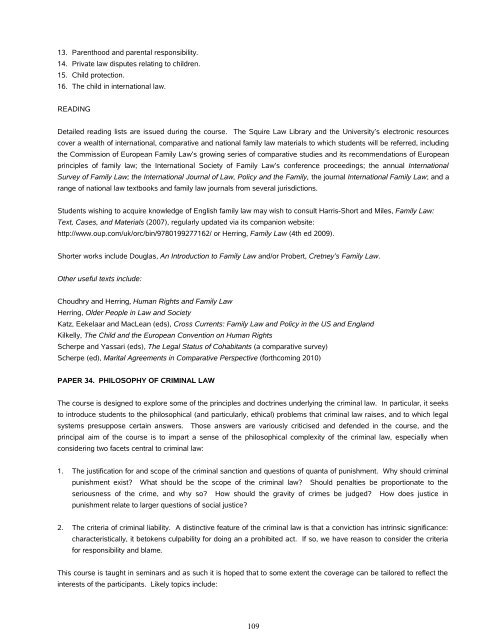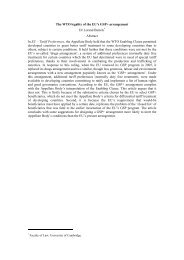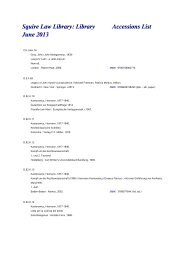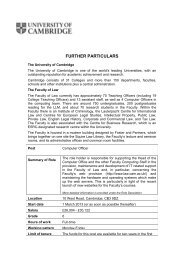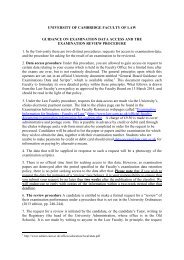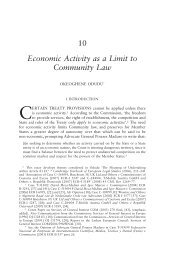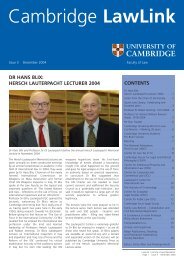Contents - Faculty of Law - University of Cambridge
Contents - Faculty of Law - University of Cambridge
Contents - Faculty of Law - University of Cambridge
Create successful ePaper yourself
Turn your PDF publications into a flip-book with our unique Google optimized e-Paper software.
13. Parenthood and parental responsibility.14. Private law disputes relating to children.15. Child protection.16. The child in international law.READINGDetailed reading lists are issued during the course. The Squire <strong>Law</strong> Library and the <strong>University</strong>’s electronic resourcescover a wealth <strong>of</strong> international, comparative and national family law materials to which students will be referred, includingthe Commission <strong>of</strong> European Family <strong>Law</strong>’s growing series <strong>of</strong> comparative studies and its recommendations <strong>of</strong> Europeanprinciples <strong>of</strong> family law; the International Society <strong>of</strong> Family <strong>Law</strong>’s conference proceedings; the annual InternationalSurvey <strong>of</strong> Family <strong>Law</strong>; the International Journal <strong>of</strong> <strong>Law</strong>, Policy and the Family, the journal International Family <strong>Law</strong>; and arange <strong>of</strong> national law textbooks and family law journals from several jurisdictions.Students wishing to acquire knowledge <strong>of</strong> English family law may wish to consult Harris-Short and Miles, Family <strong>Law</strong>:Text, Cases, and Materials (2007), regularly updated via its companion website:http://www.oup.com/uk/orc/bin/9780199277162/ or Herring, Family <strong>Law</strong> (4th ed 2009).Shorter works include Douglas, An Introduction to Family <strong>Law</strong> and/or Probert, Cretney’s Family <strong>Law</strong>.Other useful texts include:Choudhry and Herring, Human Rights and Family <strong>Law</strong>Herring, Older People in <strong>Law</strong> and SocietyKatz, Eekelaar and MacLean (eds), Cross Currents: Family <strong>Law</strong> and Policy in the US and EnglandKilkelly, The Child and the European Convention on Human RightsScherpe and Yassari (eds), The Legal Status <strong>of</strong> Cohabitants (a comparative survey)Scherpe (ed), Marital Agreements in Comparative Perspective (forthcoming 2010)PAPER 34. PHILOSOPHY OF CRIMINAL LAWThe course is designed to explore some <strong>of</strong> the principles and doctrines underlying the criminal law. In particular, it seeksto introduce students to the philosophical (and particularly, ethical) problems that criminal law raises, and to which legalsystems presuppose certain answers. Those answers are variously criticised and defended in the course, and theprincipal aim <strong>of</strong> the course is to impart a sense <strong>of</strong> the philosophical complexity <strong>of</strong> the criminal law, especially whenconsidering two facets central to criminal law:1. The justification for and scope <strong>of</strong> the criminal sanction and questions <strong>of</strong> quanta <strong>of</strong> punishment. Why should criminalpunishment exist? What should be the scope <strong>of</strong> the criminal law? Should penalties be proportionate to theseriousness <strong>of</strong> the crime, and why so? How should the gravity <strong>of</strong> crimes be judged? How does justice inpunishment relate to larger questions <strong>of</strong> social justice?2. The criteria <strong>of</strong> criminal liability. A distinctive feature <strong>of</strong> the criminal law is that a conviction has intrinsic significance:characteristically, it betokens culpability for doing an a prohibited act. If so, we have reason to consider the criteriafor responsibility and blame.This course is taught in seminars and as such it is hoped that to some extent the coverage can be tailored to reflect theinterests <strong>of</strong> the participants. Likely topics include:109


